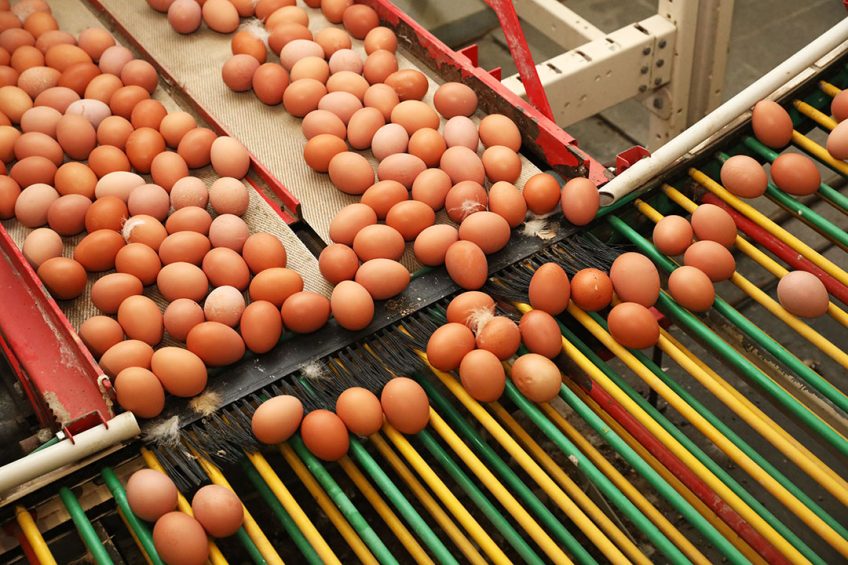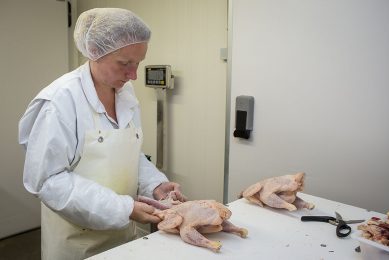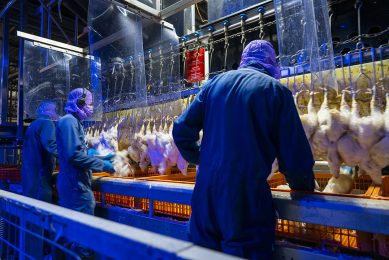Covid-19: Challenges and new opportunities in poultry sector

Massive increases in demand for shell eggs from retailers coupled with a huge drop in eggs sales in the foodservice sector, have been 2 of the major challenges facing egg companies during Covid-19.
But companies on both sides of the Atlantic believe the pandemic has already led to new business opportunities, according to speakers at the International Egg Commission’s recent business insights webinar. Greg Hinton, Vice-President of Sales for Rose Acre Farms, said Covid-19 had initially led to panic buying of eggs in supermarkets across the United States and a 200% rise in sales, which led quickly to a shortage of eggs and the introduction of rationing. Hinton added there had been a steep decline in eggs sold to the foodservice sector with a decrease of up to 80% for loose eggs. These were shifted into retail cartons for supermarkets. But this in itself led to a carton shortage , which he believes, will last until the end of the year: “Because of the shifting of loose eggs to retail it has depleted all the inventory of cartons from all carton manufacturers. Our lead in time on cartons has been pushed from 3-4 weeks to 7-8 weeks.”
There has also been a massive change in biosecurity at Rose Acre :
- 80% of staff have been working from home
- Safety measures on farms to protect team members have been introduced, including checking temperatures at guard shacks, face masks, additional deep cleaning of heavy contact areas, Plexiglas shields between packing lanes on graders, practising social distancing, Plexiglas on tables in break rooms.
 Covid-19 continues to rattle supply chains
Covid-19 continues to rattle supply chains
Retailers and farmer’s unions in the UK and beyond have been battling to ensure that egg and poultry meat supply chains remain robust in the light of unprecedented demand in recent weeks.
Strengthen customer relations
Hinton said daily calls with buyers to review many issues had started, which had strengthened customer relationships. Looking ahead at what new practices will be implemented at Rose Acre in the future, he said all the new social distancing practices including video conferencing would become the new norm and that retail eggs sales would continue to remain strong due to more people cooking more eggs at home. Demand will pick up quickly at drive-through eateries but demand at full-service restaurants may take a year or 2 to go back to pre-Covid levels.
Covid-19 Up-date
What impact is the pandemic having on the global poultry sector and how are they dealing with it.
Covid-19 creates 4 new challenges for Noble Foods
Veli Moluluo, Managing Director of UK-based Noble Foods, said Covid-19 had introduced 4 new challenges for the company. Among the challenges and solutions moving forward were:
- Labour availability – absence rates had peaked at 10% (lower than in other retail environments but still significant). There had been a lack of understanding and interpretation of government rules and guidance among some staff and key skills had been impacted by absence rate. These were overcome by increased utilisation of Agency labour and roll out of key skills training to upskill the workforce, an updated Family and Friends Scheme, an exceptional monthly employee bonus, use of extended industry driver pool and clear communication of all rules and protocols.
- Site operations – Challenges included social distancing, PPE availability, limiting site visitors for all but essential visits and the volume spikes/dips across the sector. Solutions included new protocols and site flows that were communicated to all key employees, new suppliers and sourcing for PPE, new shields added to reception areas and grader bed ends, staggered break times and limited seating in canteens and communal areas.
- Remote working – Some of the challenges included laptop and hardware availability and system/network capacity for remote areas. As a result, the company rolled out new hardware and an upgrade to Microsoft 365 and IT teams doubled the network capacity was doubled within a week.
- Meeting customer demand – Moluluo said there had been unprecedented customer demand for shell eggs – 100-150% increases in demand which had continued unabated. This had led to some quite difficult conversations with retailers. And there had been a significant drop off in the egg product business with customers such as Hilton Hotel Group and McDonalds which had dropped off overnight. Other challenges included egg availability constraints and packaging availability issues and delays. Solutions included a fixed daily order plan agreed with customers, a simplified range of products and agreed priorities to support availability, full truck ordering and the launch of a liquid egg alternative.
Moluluo said opportunities included new product launches and optimising white eggs in retailers. Noble Foods launched in April foodservice liquid egg brand into retailers to meet demand. The company decided to continue its TV advertising campaign promoting the Happy Egg Company during the Covid-19 pandemic. “Brands that invest in recessionary periods or in periods of national difficulty generally reap the benefits in the future.” It is likely to have additional TV advertising in the UK to capitalise on the surge in demand. And he added that white eggs destined for McDonalds liquid egg products had gone to Tesco’s shell egg market. Moving forward, Tesco is keen to look at white eggs options and take advantage of the efficiencies of the white bird.













